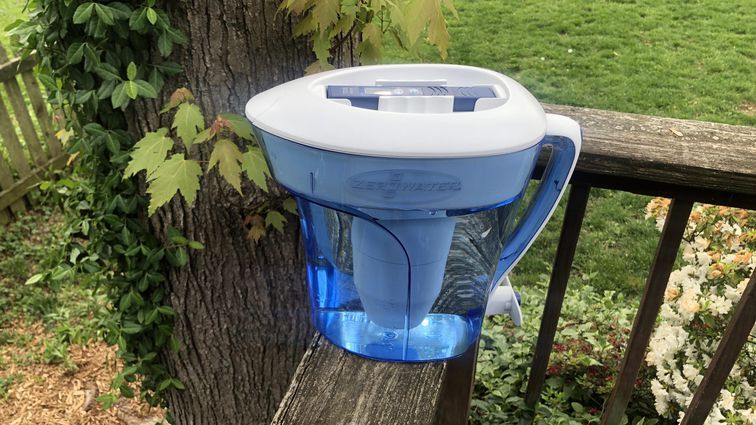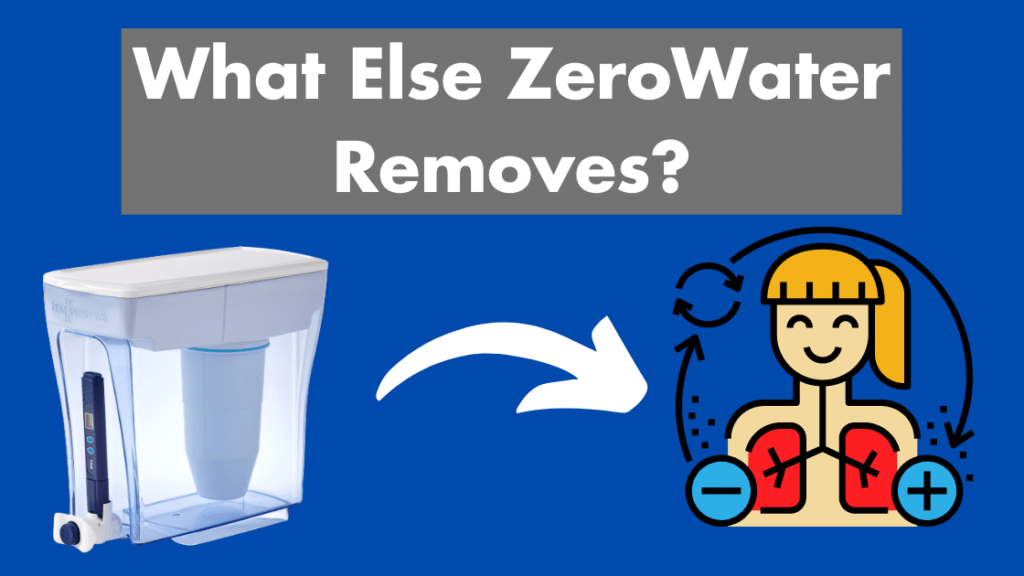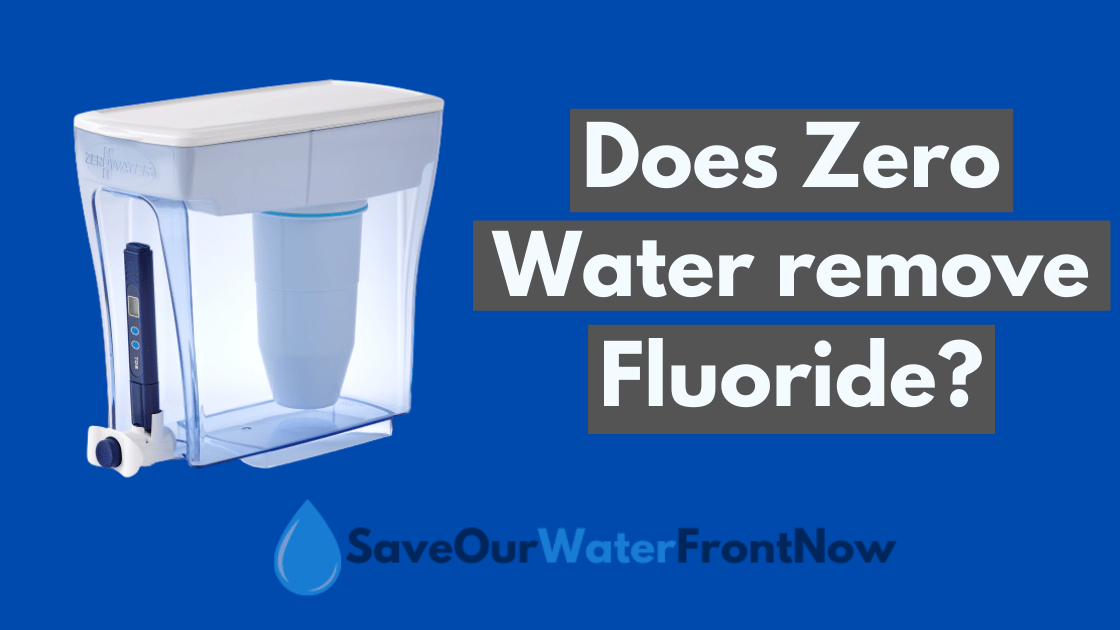Zerowater filters are quite famous. They are known to be one of the most popular water filters. But then even the most well-known products have their own drawbacks at times. It’s high time to answer one of the most asked questions, does ZeroWater remove fluoride?
To get to know the answer to this question, make sure you read the rest of the article minutely. Since, ZeroWater filters are already quite well-known for the removal of most of the contaminants and intoxicants, not much information about the complete demolition of highly toxic chemicals like fluoride and chlorine or even lead for that matter is mentioned by the company itself.
Contents
Does ZeroWater filters remove fluoride?
Fluoride levels in tap water can vary in huge amounts sometimes. Usually, the tap water in your homes contain fluoride amounts between 0.6 ppm to 0.10 ppm. ZeroWater filter makes the fluoride amounts completely disappear from the water making it 0.0 ppm.
Just like PUR filters remove fluoride even Zero Water filters remove fluoride.
It is totally surprising to see the zero water filter not only filter our fluoride but also remove reverse osmosis filters. This is shown in our article of Does reverse osmosis remove fluoride, where the reverse osmosis filters too made the amounts of fluoride in the home tap water reduce from 0.6ppm to 0.10 ppm making the water absolutely safe to consume by anyone and everyone.
How does Zero Water remove fluoride?

Fluoride is not simply known to be a very dangerous chemical to consume, it’s disadvantages are a lot more than it’s advantages shown to the world. It is also a very difficult chemical to get completely rid of from your water.
Just a few steps to filter out fluoride from the water you want to consume is not enough to make it safe for consumption. As mentioned in, Does boiling water remove fluoride, a lot more tedious steps are required to eliminate fluoride from the water you want to consume. In a small-sized water pitcher mainly, there have to be various stages of filtration in order to receive good results at the end.
For instance, now since Brita water filters have just 2 stages in their water filters it will definitely fail to remove these toxic chemicals like chlorine and fluoride. No doubt, it will manage to eliminate the basic contaminants but it will fail to remove these particular chemicals which again is unsafe and unhealthy for your consumption.
While, on the other side, ZeroWater filters are made of 5 stages of filtration. And hence, these 5 stages of filtration make sure to take out not only the basic contaminants but also chemicals like fluoride.
STAGE 1: Helps avoid the water get cloudy by eliminating particles like dust and rust with the coarse filter screen.
STAGE 2: Takes out the additional solids left back with the help of the foam distributor
STAGE 3: Stops bacteria from growing in the water, eliminates all the possible organic chemicals or compounds like chlorine, mercury, pesticides, insecticides using its multi-layer activated carbon and oxidation reduction alloy.
STAGE 4: Removes radiological compounds, non-metals, metals with the dual comprehensive ion exchange resin built in the water filter.
STAGE 5: With the nonwoven membrane layers and ultra-fine screen that completely removes the solids left behind.
These 5 stages make the ZeroWater filter able to remove fluoride from the water making sure every stage makes an effective change in the water you want to consume on a daily basis.
What else does ZeroWater remove besides fluoride?

Fluoride is definitely a chemical that each and everyone wants to avoid consuming but luckily and also thankfully water filters like ZeroWater can make things like these easy by filtering out complete portions of fluoride from water.
However, it’s not only fluoride as a chemical that you’ll want to avoid but also other various contaminants that you don’t want in your water at any cost.
Here’s a comparison of Zero Water VS Brita.
| Image | Product | Features | Price |
|---|---|---|---|
 | ZeroWater ZP-010 |
| Check Price On Amazon |
 | Brita Water Filter |
| Check Price On Amazon |
When it comes to inorganics like fluoride, chlorine, cyanide, nitrite, nitrate, and also sulfide zero water filters have an average reduction of 71% while Brita water filters have the average reduction of just 33% removal of these contaminants. The ZeroWater filter takes out 95% of chlorine and so does the Brita water filter. The percent of cyanide removal in Zerowater is 31% and in Brita 0%. When it comes to fluoride, ZeroWater removes 90% of it while Brita water filters just remove 17% of it. ZeroWater also removes 74% Nitrate, 81% Nitrite, and 55% sulfide. On the other hand, Brita removes 0% Nitrate, 28% Nitrite, and also 81% sulfide.
Now talking about the removal of metals like iron, antimony, arsenic, asbestos, barium, beryllium, cadmium, chromium, copper, cobalt, lead, mercury, manganese, etc here again ZeroWater filters overtake Brita water filters with the average reduction of metals as 95% from Zerowater filters and 68% from Brita water filters. ZeroWater takes out 97% lead, 96% mercury, 98% manganese, 81% silver, 98% zinc, 99% copper, 97% antimony, 97% asbestos, 99.9% chromium 6, cobalt 99%, 99% thallium, 99% uranium. Brita water filters remove 80% lead, 92% mercury, 52% manganese, 52% silver, 99% zinc, 99% copper, 91% antimony, 8% asbestos, 23% chromium 6, 95% cobalt, 93% thallium, 90% uranium.
These particular figures show clearly how ZeroWater filters outperform Brita water filters whether it is about inorganic contaminants or metals making ZeroWater better than brita. Zerowater filters easily remove the most harmful contaminant as well as almost all the possible metals you can think of that exist in water. Brita water filters do remove some inorganic as well as some metals but not a good enough amount to consider it better than zerowater filters.
Those figures up there are the reason why ZeroWater has always been preferred over Brita or any other filter most of the time.
ZeroWater filter problems
It is quite a common mistake to not be able to choose the right filter that actually removes fluoride from your water. And also, some water filters are bound to have some common problems like maybe any leakages or even breakages for that matter. While making the right choice a lot of things matter like the company, how long it will last, and even how it functions in day-to-day life.
How long does a ZeroWater filter last?
This is a big problem that completely depends on the person making the choice of what to choose from. One of the biggest factors that matter the most while choosing a water filter is the amount of water you tend to consume in one day or even on a daily basis.
When it comes to ZeroWater filter each and every cartridge of it filters about 25-40 gallons of water. But the main thing this depends on is the level of TDs that is the total dissolved substances in your water. The more the level of TDs in the water, the harder the filter gets to work, and the faster it gets out. You’ll get to know the levels of TDs in your water only after testing it and to make that easy for you ZeroWater gives you a TDs water meter along with the filter.
ZeroWater TDs table
After you have tested the TDs level in your water, you can then match it with the quantity of water expected per cartridge. The table below will show you how much filtered water you must probably expect before thinking of replacing the filter.
| TAP WATER TDS. | CONTAMINANTS LEVEL | QUANTITY OF WATER EXPECTED PER CARTRIDGE. |
| 002-050 | MODERATE | ABOVE 40 GALLONS |
| 051-200 | NORMAL RANGE | 25-40 GALLONS |
| 201-300 | ABOVE NORMAL | 15-25 GALLONS |
| 301-400 | VERY HIGH | 8-15 GALLONS |
| 401+ | EXTREMELY HIGH | 8 GALLONS & BELOW |
How much does it cost?
Keeping away the problem of how many gallons you can receive per filter, most people face a bigger problem of replacing their current filters quite often which no doubt tends to get really expensive.
Now when it comes to the prices of the water filters the prices keep changing. But on average a filter will cost you $15 which then if rounded up throughout the year sums up to $270 dollars per year.
If you are living alone this amount may be quite reasonable for you to invest in but not forgetting there are way more options that give you safe, healthy and fluoride-free water to consume in a much cheaper way that is in a way your wallet and bank account will love you too much and with the better quality too.
Should you buy a ZeroWater filter?
Like you have witnessed earlier in this article, the ZeroWater filter removes the total amount of fluoride present in your water unlike other water filters. For instance, Brita water filters or even Great Value do not remove fluoride from your water.
The ZeroWater filters give you fluoride-free water that benefits you in many ways especially when it lets you use the water for fluoride detox.
It is best to slowly reduce your fluoride intake and gradually completely stop any amounts of fluoride intake in your body through the help of the steps mentioned in the fluoride detox.
Now when it comes to buying a ZeroWater filter it depends on a few factors. Like mentioned earlier, the main factor to keep in mind before choosing a filter is to know how many people will be using the filter. In case, 4 people decide to use the ZeroWater filter, those 4 people will be paying a lot for those replacement filters.
Similarly, even if there are 2 people who will be using the ZeroWater filter and they drink a good and healthy amount of water everyday, they’ll come across the same problem.
Water pitchers are usually really cheap compared to other filters out there. So, the best recommendation is to buy this ZeroWater filter only if 1 person will be using the filter and if that person is absolutely okay with paying less for short term and much more for long term with lots and lots of replacement filters.
Conclusion
Hoping you have your answer that ZeroWater filters do remove fluoride from your water making it fluoride-free and beneficial to consume or use in any way possible. This filter not only takes out fluoride but also other inorganic compounds and metals that can be really unsafe to intake and hence it is considered one of the most recommended water filters.
Frequestly Asked Questions
How does ZeroWater taste?
It is sometimes impossible to notice the difference in the tastes of the tap water and filtered water depending from where it comes but more than half of the times you can easily spot and taste the difference between tap water and filtered water from ZeroWater filters.
The tap water can sometimes taste really muddy or even soily while the filtered water tastes the right opposite that is pure and clean. Which is exactly what you are apparently consuming, pure water.
Hence, ZeroWater passes the taste test too.
Can ZeroWater be used in well water?
All of you know how tap water is unsafe to consume directly without treating it. But when it comes to comparing well water to city tap water, the city water is used to be treated for some contaminants like various viruses and bacterias.
Now the main problem is that the ZeroWater filter cannot afford to remove these particular contaminants from your water making it unsafe for consumption. This means that ZeroWater can be used for tap water but not for well water.
It will definitely eliminate the amounts of fluoride present in the water but it won’t be able to remove contaminants like bacterias and viruses.
In order to make both the types of contaminants vanish together from your water, you will have to look for a water filter that is specifically designed and built for this purpose.
How fast does ZeroWater filter water?
The ZeroWater pitcher is known now and even earlier to filter a complete jug of water in literally 5 minutes and 16 seconds.
Like mentioned earlier, this action depends on the property of TDs levels in your water. The greater the level of TDs in your water, the longer it will take to filter the water completely.
- Warmer water could cool Montana’s trout fishing economy - September 7, 2022
- Water Released from Crystallizing Magma can Trigger Earthquakes in Yellowstone - September 5, 2022
- Thermal Infrared Remote Sensing at Yellowstone 101 - August 29, 2022

